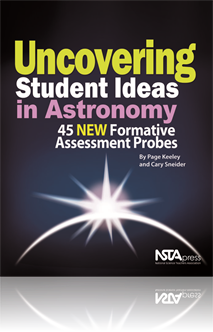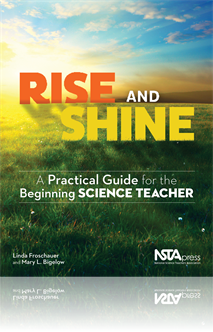All Book Chapters
Book Chapter
Does the Moon Orbit the Earth?
The purpose of this assessment probe is to elicit students’ ideas about the Moon’s motion. The probe is designed to find out whether students recognize that the Moon orbits the Earth, and, if so, how long they think it takes to complete one orbit...
Book Chapter
The purpose of this assessment probe is to elicit students’ ideas about sunspots. The probe is designed to determine if students are aware of a prominent feature of the Sun that they can observe under safe conditions—sunspots—and if they know w...
Book Chapter
The purpose of this assessment probe is to elicit students’ ideas about the day-night cycle. The probe is designed to find out if students can relate the shape of the Earth and its spin to why we have day and night. ...
Book Chapter
The purpose of this assessment probe is to elicit students’ ideas about Earth’s orbit. The probe is designed to find out whether students recognize that the Earth orbits around the Sun. ...
Book Chapter
As a thesaurus of science concepts, The Everyday Science Sourcebook, Revised 2nd Edition: Ideas for Teaching in Elementary and Middle School provides easy access to science activities that teach science concepts that correspond to national standards....
Book Chapter
As you begin your science teaching career, you will have many questions. The best place to start is to ask questions of yourself. You may not be able to answer all of the questions quickly or casually, but they should be food for thought. Spend time ...
Book Chapter
Although teachers have a huge influence on students, no one can have the effect on students that parents can. No matter the student’s age, the approval of parents is a fundamental need of every child and a powerful motivator. Parents can support yo...
Book Chapter
Consider observations by others as opportunities to improve your skills as a teacher. Be proactive in providing your observer with as much information as possible to make their visit productive. Informed comments from an observer can help you identif...
Book Chapter
Even the most competent, professional teacher in the school was once a first-year teacher and faced issues similar to yours. Many of your colleagues will be sympathetic to your struggles and willing to help. Take advantage of their expertise and expe...
Book Chapter
End-Of-Year Activities And Reflections
By spending a little time at the end of the year organizing your materials and reflecting on your experiences as discussed in this chapter, you’ll be ready for the challenges at the beginning of the next year. ...
Book Chapter
Before You Open The Classroom Or Lab Door For Students
No one is going to tell you what to do during the most critical day of school—the first day. You are responsible for creating the atmosphere and tone that your classroom will provide for the entire year and beyond. The expectations, routines, and p...
Book Chapter
. The way you begin the school year will affect everything that occurs in your classroom and with your colleagues for the remainder of the year—and beyond. When you were student teaching, your cooperating teacher had already set the stage for you. ...
Book Chapter
Creating An Environment For Learning
Think of your classroom as an ecosystem—a set of interconnected components such as the classroom itself, the available resources, and the people who inhabit it. When these components are working well together, learning can be a joyous, exciting adv...
Book Chapter
When you were student teaching or doing an internship, your cooperating teacher already had lab routines and rules in place. But now you’re in charge! You must be proactive about student safety during laboratory activities. You can’t claim ignora...
Book Chapter
When you see a purpose in what you do, feel confident, and like what you do, it shows. Students are among those who can immediately read others. They will know if you are eager to get to school each day, if you enjoy what you teach, and if you care a...




